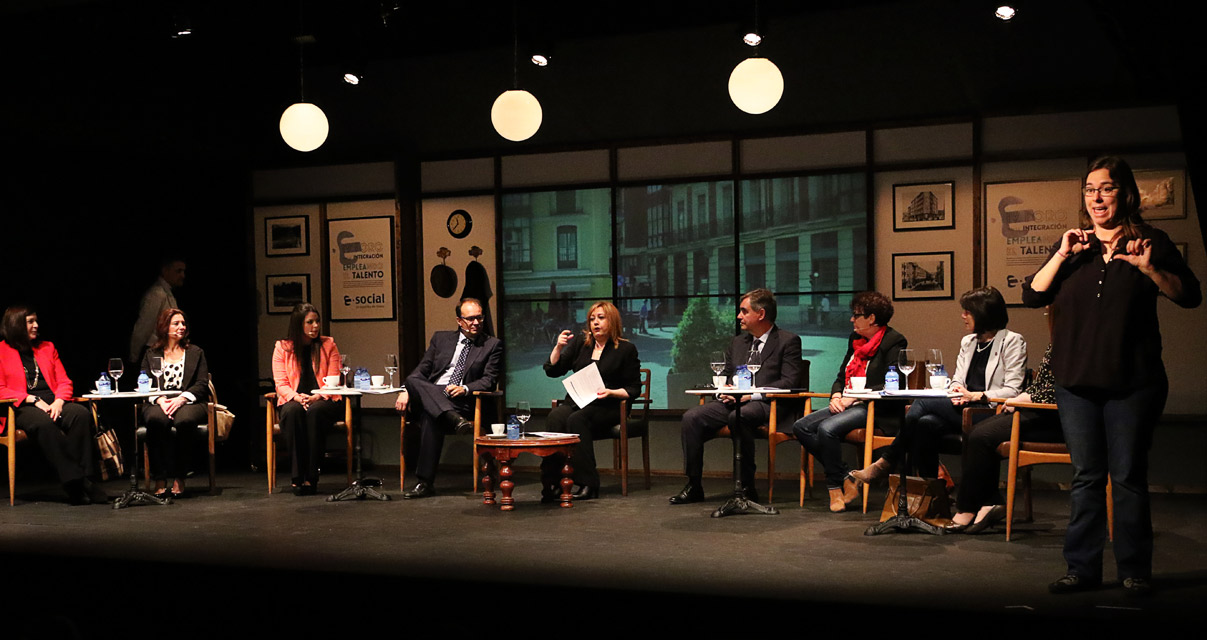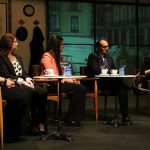
"Workers from vulnerable collectives contribute motivation, involvement and improve the work-place climate in companies"
The IV Forum-Symposium “Clece por la Integración” [Clece for Integration] addressed the topic of the integration of socially vulnerable collectives into the work-place
As the sponsor of the initiative, Clece has integrated 6,549 people from such collectives within its staff of more than 73,200 employees.
Valladolid, 3rd June, 2016. Improving employability and exploring formulas for public-private co-operation are some of the key elements which contribute to an employment market with equal opportunities for all. This is one of the principal conclusions to emerge from the IV “Clece por Integración” Forum which took place yesterday at the Calderón Theatre in Valladolid, entitled “EMPLOYing Talent”.
The Forum, organized by Clece, gathered together different actors involved in the integration of socially vulnerable collectives such as people with disabilities, those at risk of social exclusion, victims of gender-based violence, and young unemployed people.
Local authority representatives who attended were Rafaela Romero Viosca, Councillor for Social Services at Valladolid Town Hall, and Carlos Raúl de Pablos Pérez, the Regional Social Services Manager of the Family and Equal Opportunities Department of the Regional Community of Castilla and León. Felicidad Viejo Valverde, Vice-Rector for Students at the University of Valladolid, UVA, represented the education sector, with Verónica Muñoz Salgado, Careers Councillor at the Valladolid Town Hall contributing from the employment perspective. Clece attendees were Cristóbal Valderas, the President of Clece, and Purificación González, Clece’s Director of Human Resources. Both gave an overview of the private company, while Clece employees Melanie Blanco García and María Fernández Barrul talked about their own personal experiences.
The experiences shared by Melanie Blanco García, representing the young people’s collective, and by María Fernández Barrul, a victim of gender-based violence, clearly showed that despite the different root causes of vulnerability, all these collectives encounter shared barriers when accessing the employment market. Among the main barriers revealed in the Forum were lack of training and qualifications, lack of motivation, and low levels of experience or misinformation. Added to this are environmental conditions such as job insecurity, or stereotyping and social prejudice.
To combat such difficulties, Carlos Raúl de Pablos Pérez, emphasized the value of social pacts. “The success of the Social Services model is precisely due to the fact that the Regional Community is not the sole player, but collaborates with local authorities as part of a social agreement”. This social pact can be seen in the Integrated Employment Strategy II, 2016-2020, implemented by the autonomous community authorities, which has a Specific Employment Plan for vulnerable collectives. He pointed out “You have to talk about social investment, and not just about social cost, as for each Euro invested, the return for society is times 2.3”.
From the local authorities’ perspective, Rafaela Romero Viosca put the emphasis on the potential for public-private collaboration and also a responsible public policy relating to measures such as the “inclusion of reserved contracts for Special Employment Centres and social clauses in public contracts” in order to facilitate access by disadvantaged people and collectives to employment. Rafaela also indicated the need to work on the quality of employment in order to avoid turning workers into vulnerable people due to precarious salaries”.
Matching Training with the Demand for Employment
One of the big challenges in encouraging integration is increasing the employability of people through career guidance, professional training and support for obtaining employment. From the education perspective, Felicidad Viejo Valverde commented that “students find support during internships very important” in order to facilitate access to employment. In addition, after University the other route which is encouraged is “mobility, with grants for young people so that they can go abroad, get trained and obtain experience”. From the careers advice perspective, Verónica Muñoz Salgado indicated that “chronic long-term unemployment is a problem of huge dimensions” for those in different vulnerable situations trying to access the employment market.
Company Responsibilities
Cristóbal Valderas Alvarado talked about “how Clece has worked on an integrated model which shows how employment plays a key role in equal opportunities and social fairness. Working in daily collaboration with 350 associations, today there are 6,549 employees on our staff who come from socially vulnerable collectives. In only three years, the evolution has been from 3,000 to more than 6,500 people. The Clece President warned that among these vulnerable collectives those at special risk were those “over 45 years of age, and the long-term unemployed with family responsibilities”. Purificación González Pérez, highlighted the need to “encourage the triangle formed by the third sector, the authorities, and companies, to move up a gear” in order to achieve the integration of such disadvantaged people who “contribute intangibles such as motivation, involvement, improvement in the work-place climate and who provide examples of how to overcome difficult situations”.
First-Hand Experience
As the young person’s representative, Melanie Blanco García communicated an optimistic message as she has been able to progress her career after her final year thanks to the job opportunity Clece has given her. Although Maria is aware of the great challenges confronting her generation, she asserted the right of young people to have “the opportunity to have a life, a house, and not to have to depend on their parents, who often experience their own difficult times”. María Fernández Barrul, who was a victim of gender-based violence, found a way out of her situation through a job. “Through work, I feel fulfilled, I have the satisfaction of being able to support my children, and I am to free to be myself”. To all those women who have experienced her own situation, she encouraged them “not to give up, to get it out of your mind that you can’t do it, and that in the end, there is always a way out of gender-based violence”.






























